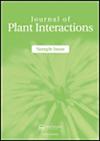Utilizing transcription factors for improving banded leaf and sheath blight disease resistance in maize: a review
IF 3.3
3区 生物学
Q2 PLANT SCIENCES
引用次数: 0
Abstract
ABSTRACT Banded leaf and sheath blight (BLSB) disease, incited by Rhizoctonia solani, is destructive, difficult to manage and gravely threatens maize (Zea mays L.) production across continents. Plant transcription factors (TFs) act as functional nodes that integrate defense signals to activate relevant immune outlets via large-scale transcriptional reprogramming of the expression of massive sets of defense-related genes (DRGs). Recent studies revealed complex changes in the maize transcriptome during BLSB infection. More than 30 TFs belonging to the WRKY, NAC, TCP, bHLH, and bZIP families, among others, have been putatively identified as core genes inducible in maize by the virulence factors of R. solani. Sadly, no progress has been made in characterizing these TFs in maize resistance to BLSB. Having reviewed the progress made so far, we propose future studies to prioritize functional characterization of the potential TFs and their manipulation through genome editing technology as well as the use of synthetic TFs to improve maize resistance to BLSB.利用转录因子提高玉米带状叶枯病和鞘枯病抗性的研究进展
摘要:由纹枯菌引起的带状叶鞘枯萎病具有破坏性,难以控制,严重威胁着各大洲玉米的生产。植物转录因子(TF)作为整合防御信号的功能节点,通过大规模转录重编程大量防御相关基因(DRG)的表达来激活相关免疫出口。最近的研究揭示了BLSB感染期间玉米转录组的复杂变化。超过30个属于WRKY、NAC、TCP、bHLH和bZIP家族的转录因子已被推定为玉米中可被龙葵毒力因子诱导的核心基因。遗憾的是,在表征玉米对BLSB抗性中的这些TF方面没有取得任何进展。在回顾了迄今为止取得的进展后,我们建议未来的研究优先考虑潜在转录因子的功能表征及其通过基因组编辑技术的操作,以及使用合成转录因子来提高玉米对BLSB的抗性。
本文章由计算机程序翻译,如有差异,请以英文原文为准。
求助全文
约1分钟内获得全文
求助全文
来源期刊

Journal of Plant Interactions
PLANT SCIENCES-
CiteScore
5.30
自引率
6.20%
发文量
69
审稿时长
>12 weeks
期刊介绍:
Journal of Plant Interactions aims to represent a common platform for those scientists interested in publishing and reading research articles in the field of plant interactions and will cover most plant interactions with the surrounding environment.
 求助内容:
求助内容: 应助结果提醒方式:
应助结果提醒方式:


